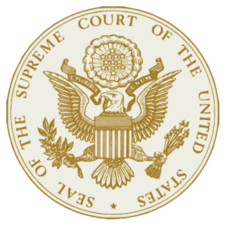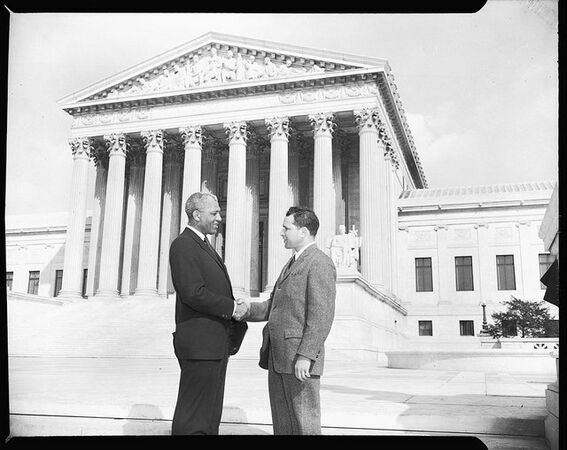Environmental Protection Agency v. Calumet Shreveport Refining, LLC
 | |
| Environmental Protection Agency v. Calumet Shreveport Refining, LL | |
| Docket number: 23-1229 | |
| Term: 2024 | |
| Court: United States Supreme Court | |
| Important dates | |
| Argued: March 25, 2025 | |
| Court membership | |
| Chief Justice John Roberts • Clarence Thomas • Samuel Alito • Sonia Sotomayor • Elena Kagan • Neil Gorsuch • Brett Kavanaugh • Amy Coney Barrett • Ketanji Brown Jackson | |
Environmental Protection Agency v. Calumet Shreveport Refining, LLC is a case concerning whether the United States Court of Appeals for the District of Columbia Circuit must be the venue for small oil refinery challenges to the requirements of the Clean Air Act's Renewable Fuel Standard program. The case is argued before the Supreme Court of the United States on March 25, 2025, during the court's October 2024-2025 term.
because the agency's denial actions are 'nationally applicable' or, alternatively, are 'based on a determination of nationwide scope or effect.' 42 U.S.C. 7607(b)(1)."[1]
The case came on a writ of certiorari to the United States Court of Appeals for the Fifth Circuit. To review the lower court's opinion, click here.
Why it matters: The case could clarify whether challenges by small oil refineries regarding exemptions to the Clean Air Act's Renewable Fuel Standard program's requirements lie in the U.S. Court of Appeals for the District of Columbia Circuit. The decision could also determine whether the EPA's denial actions are nationally applicable based on nationwide scope.
Background
Case summary
The following are the parties to this case:[2]
- Petitioner: Environmental Protection Agency
- Legal counsel: Sarah M. Harris (acting United States Solicitor General)[3]
- Respondent: Calumet Shreveport Refining, L.L.C., et al.
- Legal counsel: Shelby Leigh Dyl (Pillsbury Winthrop Shaw Pittman LLP), Michael Robert Huston (Perkins Coie LLP)
The following summary of the case was published by Oyez:[4]
| “ | Congress amended the Clean Air Act to establish the Renewable Fuel Standard (RFS) program, which requires refiners and importers of transportation fuel to blend increasing amounts of renewable fuels into their products each year. To comply, these companies must either blend renewable fuels themselves or purchase credits called Renewable Identification Numbers (RINs) from other companies that do the blending. Recognizing that this might create hardship for small refineries (those processing less than 75,000 barrels of crude oil daily), Congress created three exemptions: an initial blanket exemption through 2011, extensions based on a Department of Energy study, and case-by-case exemptions that small refineries could petition for based on “disproportionate economic hardship.”
The U.S. Court of Appeals for the Fifth Circuit vacated the EPA’s adjudications, denied a change of venue to the U.S. Court of Appeals for the D.C. Circuit, and remanded, based on its conclusion that the denial was (1) impermissibly retroactive; (2) contrary to law; and (3) counter to the record evidence.[5] |
” |
To learn more about this case, see the following:
Clean Air Act
According to the U.S. Environmental Protection Agency (EPA), "Congress designed the Clean Air Act to protect public health and welfare from different types of air pollution caused by a diverse array of pollution sources."[6][7]
The act requires the federal government to set national air quality standards to reduce air pollution and states to implement the standards through individual plans subject to approval by the EPA. National air quality standards and air pollution regulation are enforced primarily by state governments; states issue permits, monitor compliance, and conduct facility inspections, while the EPA has authority to review state actions. The act also requires regulation of stationary and mobile sources of air pollution and limits on hazardous air pollutant emissions, among other provisions.[8][9]
Timeline
The following timeline details key events in this case:
- March 25, 2025: The U.S. Supreme Court heard oral argument.
- October 21, 2024: The U.S. Supreme Court agreed to hear the case.
- May 20, 2024: Environmental Protection Agency appealed to the U.S. Supreme Court.
- November 22, 2023: The United States Court of Appeals for the Fifth Circuit The United States Court of Appeals for the Fifth Circuit granted the refineries’ petitions for review, vacated the challenged adjudications, denied a change of venue, and remanded the case.
Questions presented
The petitioner presented the following questions to the court:[1]
Questions presented:
|
Oral argument
Audio
Audio of the case will be posted here when it is made available.
Transcript
A transcript of the case will be posted here when it is made available.
Outcome
The case is pending adjudication before the U.S. Supreme Court.
October term 2024-2025
The Supreme Court began hearing cases for the term on October 7, 2024. The court's yearly term begins on the first Monday in October and lasts until the first Monday in October the following year. The court generally releases the majority of its decisions in mid-June.[10]
See also
External links
- Search Google News for this topic
- U.S. Supreme Court docket file - Environmental Protection Agency v. Calumet Shreveport Refining, LLC (petitions, motions, briefs, opinions, and attorneys)
- SCOTUSblog case file for Environmental Protection Agency v. Calumet Shreveport Refining, LLC
Footnotes
- ↑ 1.0 1.1 U.S. Supreme Court, "23-1229 ENVIRONMENTAL PROTECTION AGENCY V. CALUMET SHREVEPORT REFINING, LLC" October 21, 2024
- ↑ Supreme Court of the United States, "No. 23-1229," accessed November 25, 2024
- ↑ Note: At the time that the Court accepted this case's writ of certiorari, legal counsel was provided by then-U.S. Solicitor General Elizabeth B. Prelogar. Prelogar stepped down from her position on January 20, 2025, following the swearing-in of President Donald Trump (R) to his second term. After taking office, Trump appointed Sarah M. Harris to serve as the acting U.S. Solicitor General until her successor is confirmed and sworn in.
- ↑ Oyez, "Environmental Protection Agency v. Calumet Shreveport Refining, LLC," accessed November 25, 2024
- ↑ 5.0 5.1 Note: This text is quoted verbatim from the original source. Any inconsistencies are attributable to the original source.
- ↑ U.S. Environmental Protection Agency, "Evolution of the Clean Air Act," accessed November 25, 2024
- ↑ U.S. Environmental Protection Agency, "Clean Air Act Requirements and History," accessed November 25, 2024
- ↑ U.S. Environmental Protection Agency, "Summary of the Clean Air Act," accessed November 25, 2024
- ↑ U.S. Environmental Protection Agency, "National Air Activity Dashboard," accessed November 25, 2024
- ↑ SupremeCourt.gov, "The Supreme Court at Work: The Term and Caseload," accessed January 24, 2022
| |||||||||||



